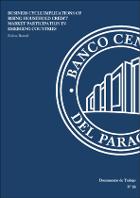Business cycle implications of rising household credit market participation in emerging countries
Documento de Trabajo; N° 24
Date published
2019-12-01Author
Document language
engMetadata
Show full item recordAbstract
A small open emerging-economy model is extended with a household sector financial constraint to investigate business cycle implications of a rise in household access and use of financial services. Estimating the model on Mexican data and consistent with empirical findings, this paper finds that a rise in household credit market participation: yields larger aggregate consumption volatility and amplifies the effects of shocks in the domestic economy, particularly those transmitted through the interest rate channel. The estimated model also highlights that: the lesser financial frictions are, the lower is the increase of consumption growth and trade balance volatility driven by a rise in household credit market participation and trend productivity shocks become a more relevant source of business cycle fluctuations. Finally, standard measures of predictive accuracy suggest that the extended model outperforms the baseline emerging market model.
Subject
Keywords
Collections
 This work is licensed under a Creative Commons Reconocimiento-NoComercial 4.0.This document has been deposited by the author (s) under the following certificate of deposit
This work is licensed under a Creative Commons Reconocimiento-NoComercial 4.0.This document has been deposited by the author (s) under the following certificate of deposit

